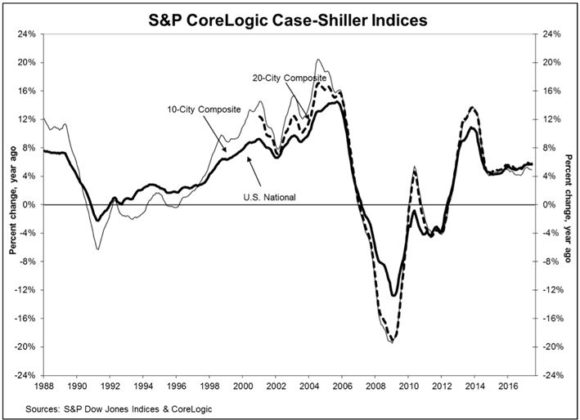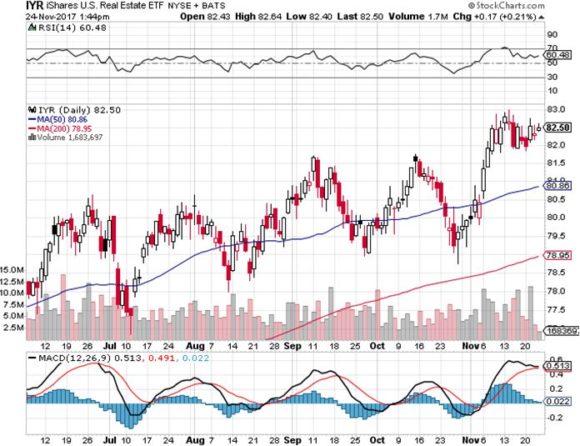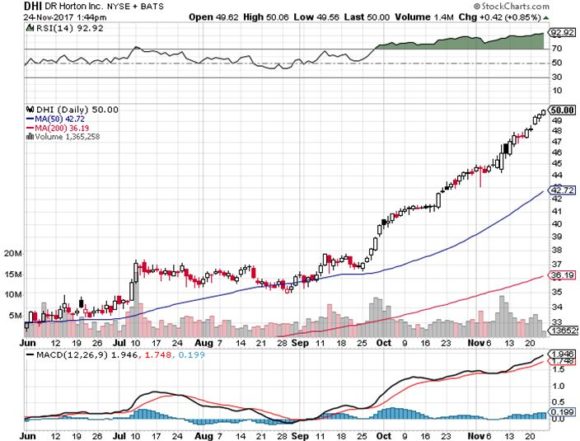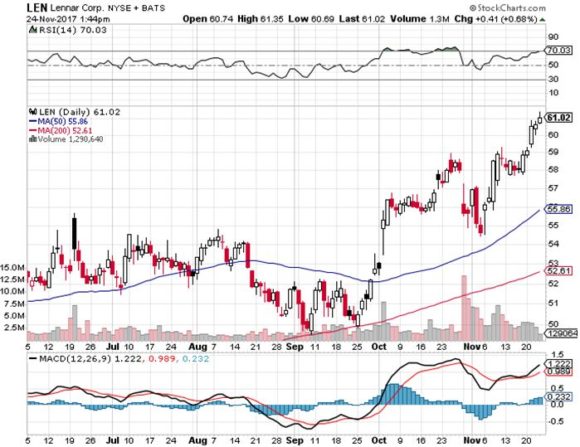Will Your Home Survive the Tax Bill?
After riding the gravy train for six fabulous years, real estate agents are now wringing their hands over the futures of home prices.
The top question asked at open houses these days is whether the loss of home mortgage interest and local and state tax deductions will bring the market to a screeching halt.
Should you now be dumping your positions in homebuilders like Pulte Homes (PUL), DH Horton (DHI), and Lennar Homes (LEN). One of the top performing sectors of 2017?
As a result of these proposals now winding their way through congress the average Californian homeowner is looking at an average $10,000 jump in his tax bills.
Things are nearly as bad in New York, New Jersey, Illinois, Oregon, and Washington. Combined, these states account for nearly 50% of US GDP.
You would think having a real estate guy for president would be good for real estate.
That is not necessarily so.
Remember that Trump controlled entities went bankrupt four times with his high risk, junk financed property ventures.
You may lack his skills in extricating himself from these misadventures, let alone reap billions of dollars in tax benefits.
Suffice it to say, it's complicated.
This is important because most individuals' best performing investment over the past six years has been their home equity.
Depending on where you live, and the amount outstanding on their mortgages, the return could be as much as 1,000%.
I know this sounds insane and unbelievable, but pull out a calculator and run your own numbers and you'll see I'm right.
There is no doubt that that the initial impetus a Trump economy will have on residential real estate is positive.
The magnitude of deficit spending that Trump is talking about with jobless claims at all times lows is highly inflationary. Trump wants to throw gasoline on the fire and toss in a few sticks of dynamite for good measure.
Real estate is the best inflation hedge out there.
What's more, rising incomes will increase purchasing power in what is already an extremely supply constrained market.
As a result, home prices should break free from the current sedentary 5% annual increases to 10% or more, for at least for the next couple of years.
The dark side of Trump's economic policies is that interest rates are starting to look like they have put in a multi decade head and shoulder top, and higher rates will come.
This is the logic behind my current bond short.
This was already a work in progress as the entire world is expecting the Federal Reserve to raise interest rates at their upcoming December 13 meeting by 25 basis points. This will be the fourth consecutive rate rise in this cycle.
Yields on ten year Treasury bonds have leapt from 1.33% in July 2015 to 2.34% today, a near record increase of 1.00% in 17 months.
The initial phase of any rate hiking cycle creates a stampede, as buyers rush to beat interest rate rises and lock in low 30 year rates.
This is a big deal.
For the past six years, I have been advising readers to refinance their homes with ultra-low interest rates offered by 5/1 ARMS, or adjustable rate mortgages.
The assumption then was that rates would remain lower for longer under a Clinton administration, and that you could always refinance again at near zero rates during the next recession.
That assumption has gone into the ash can of history, so I changed my mind.
In the Trump world, you want a 30 year fixed rate mortgage. While the rates here have jumped from 3.45% to 4.01% since July 2016, this will appear laughably low in three years.
Despite the recent pops in rates, they are coming off 200 year lows for the US, and 5,000 year lows for the rest of the world.
They have a lot more to run.
Higher interest rates bring a stronger US dollar, so the inward flood of foreign investment from abroad, primarily from China and Europe should increase.
But it won't go into New York penthouses, the kind that Donald Trump sells, because new anti-money laundering statutes have moved a cloud over this market.
Instead, foreigners will flock to commercial real estate, or the McMansions that have recently proved so popular.
Trump has also promised to repeal the Dodd-Frank financial regulation bill. This will make it easier for banks to lend, especially to low income families with low incomes and minimal FICO scores.
Subprime is about to make a big comeback.
One potential threat to housing would be the demise of Fannie Mae and Freddie Mac, long a Republican goal.
These two quasi-governmental bodies recycle home loans from the private sector and went into receivership after the 2008 crash.
The United States is the only country in the world that engages in this kind of activity, which has delivered a long-term push on home prices upward.
Trump surrogates have promised to eliminate these two entities, or at the very least, privatize them. If that occurs the bulk of conforming mortgages will lose their de facto government guarantees.
That would bring much higher long-term interest rates, possibly 100-200 basis points, a definite buzz kill for residential real estate.
Unfortunately, this story does not have a happy ending.
While short-term stimulus will deliver a higher high in real estate prices, a lower low will follow when the stimulus ends.
Boom and Bust, that has been the never ending cycle since real estate was invented. Even Donald Trump can't repeal the Law of Supply and Demand.
I don't believe the tax bill will make it through congress in its current form. A transfer of $4.5 trillion over 10 years from blue to red states is just too much of a heavy lift for a Republican Senate with a two seat majority.
What is more likely is a compromise deal where homeowners can deduct the first $10,000 each in mortgage interest and real estate.
This still would create a drag for home prices, but not enough to offset massive structural demographic and inventory tailwinds that I have been writing about for yonks.
Last week, national Home Inventories fell to only 3.9 months, the lowest in history.
While the next bust is probably at least a couple of years off, the seeds of the next financial crisis are being sewn as I write this.
Just don't forget to sit down when the music stops playing, as millions did in 2008.







